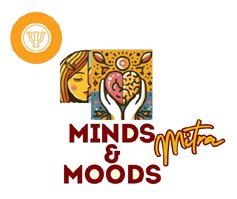A Journey to Self-Discovery: A Guide to Personal Counselling 🗺️
Personal counselling is a one-on-one therapeutic process that provides a confidential and supportive space for individuals to explore their thoughts, feelings, and behaviors. Unlike specialized therapies that focus on a single issue, personal counselling is a broad term that encompasses a wide range of concerns, from everyday stress to deep-seated emotional issues. A psychotherapist, mental health counsellor, or psychologist acts as a guide, helping a person gain self-awareness, develop coping skills, and work toward personal growth and well-being.
A Trusted Professional in Nagpur: Rrimi Bodalkar
For those in Nagpur seeking personal counselling, Rrimi Bodalkar, a Sr. Psychotherapist / Mental Health Counsellor, is a highly qualified professional. With her M.A. in Psychology (Counselling) and PGDMH (Clinical), she has a strong foundation in a wide range of therapeutic practices. Her specialization in CBT, REBT & DBT (Specialised) makes her particularly adept at providing effective and data-driven personal counselling. As an NSDC Certified professional in Psychometric Analysis & Learning Style Assessment, she is well-equipped to provide a holistic approach to your concerns, from confidence building to trauma therapy and grief and loss counselling, ensuring a comprehensive and tailored experience.
When to Seek Help: Symptoms & Causes
People seek personal counselling for a multitude of reasons, and it is a sign of strength, not weakness, to ask for help. The symptoms that often suggest a need for professional guidance include:
- Emotional Distress: Persistent feelings of anxiety, sadness, or anger that are hard to manage. This can be an early sign of a mood disorder or depression, which a depression therapist can help with.
- Life Transitions: Struggling to cope with a major life transition, such as a job change, a breakup, or a move.
- Relationship Problems: Recurring conflicts in relationship counselling, marriage counselling, or with family and friends.
- Low Self-Esteem: A persistent feeling of low confidence or self-worth. This can be a core issue addressed by a confidence building counsellor and a negative thinking therapist.
- Unhealthy Coping Mechanisms: Turning to alcohol, food, or other self-destructive behaviors to deal with stress or difficult emotions.
The causes of these issues are varied. They may stem from a history of trauma, unresolved grief and loss, chronic workplace stress, or ingrained negative thinking patterns. Personal counselling helps individuals get to the root of these issues, rather than just treating the symptoms.
The Counselling Procedure: A Path to Growth
The procedure of treatment for personal counselling is a collaborative and highly personalized process.
- Initial Assessment: The therapist will work with you to understand your background, your presenting concerns, and your goals for therapy. This may involve a Personality assessment or other Psychometric Analysis to gain deeper insights.
- Exploration & Insight: The core of personal counselling is the safe exploration of your thoughts and feelings. The therapist will help you gain insight into how your past experiences may be affecting your present and identify unhelpful patterns of behavior.
- Skill Building: The therapist will teach you new, healthier ways of coping and relating to yourself and others. This can involve techniques from:
- Cognitive Behavioral Therapy (CBT): To help you identify and challenge negative thinking patterns.
- Dialectical Behavior Therapy (DBT): To teach emotional regulation and distress tolerance.
- Rational Emotive Behavior Therapy (REBT): To address irrational beliefs and “should” statements.
- Action Plan: Together, you and the counsellor will create an action plan for making changes in your life, whether that is improving your social skills training, navigating school stress, or making a career counselling decision.
Frequently Asked Questions (FAQ’s)
Q1: How is personal counselling different from life coaching?
A: Personal counselling often delves into the past to understand present behavior and addresses mental health conditions, while life coaching is more future-focused and goal-oriented. However, a professional like Rrimi Bodalkar, who offers both, can blur that line with services like executive coaching.
Q2: Can personal counselling help with workplace stress and burnout?
A: Yes. Personal counselling can help you develop coping mechanisms for workplace stress and burnout, and can also help you determine if a change in your career counselling path is necessary.
Q3: How long does personal counselling take?
A: The duration of personal counselling varies greatly depending on the individual’s goals and the complexity of the issues. Some people find a few sessions sufficient, while others may benefit from a long-term therapeutic relationship.
Q4: Is personal counselling confidential?
A: Yes. The information you share with your therapist is confidential and protected by patient-client privilege, with some legal exceptions.
Q5: What is the benefit of personal counselling?
A: The benefits include increased self-awareness, improved emotional regulation, better relationship counselling skills, and a greater sense of confidence building and overall well-being.

